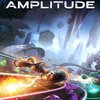 Amplitude (2016)
Amplitude (2016)
Developer: Harmonix
Publisher: Harmonix
Platforms: PS3, PS4 (Reviewed)
Price: $19.99
Release Date: Jan. 5, 2016
Copy purchased by reviewer
2015 was not a good year for rhythm games. Perhaps the first sign was the lukewarm reception of Persona 4: Dancing All Night . Despite the clamoring of a desperate fanbase, the game sold a paltry 90,000 units in North America. Then Rock Band 4 released, accompanied by a disappointing track list and new hardware that was flimsy at best ( and non-functional at worst ). Even Guitar Hero Live , the most recent in Activision’s royal family of rockstar simulators, sparked outrage with sparse on-disc content and DLC “rentals”. It seems that the modern gaming public no longer gets the same thrill from shredding on a plastic guitar, pressing an empty pedal, or belting into a USB microphone for hordes of ravenous, virtual fans.
Amidst all of this disappointment, I can’t help but long for a simpler time, when rhythm games were about, well, music. A time before peripherals and leader-boards. A time known as… 2003.
In 2003, then-unknown developer Harmonix released the original Amplitude for the Playstation 2. The gameplay elements were relatively simple: the player controls a “blaster” travelling along a vertically scrolling track. Notes travel down the track, and the player must press one of three corresponding face buttons on the controller in order to hit the note as it reaches the blaster. The game featured some songs from mainstream artists, but with a clear focus on more underground electronica, including music written, produced, and performed by Harmonix staffers such as Kasson Crooker and the band Freezepop.
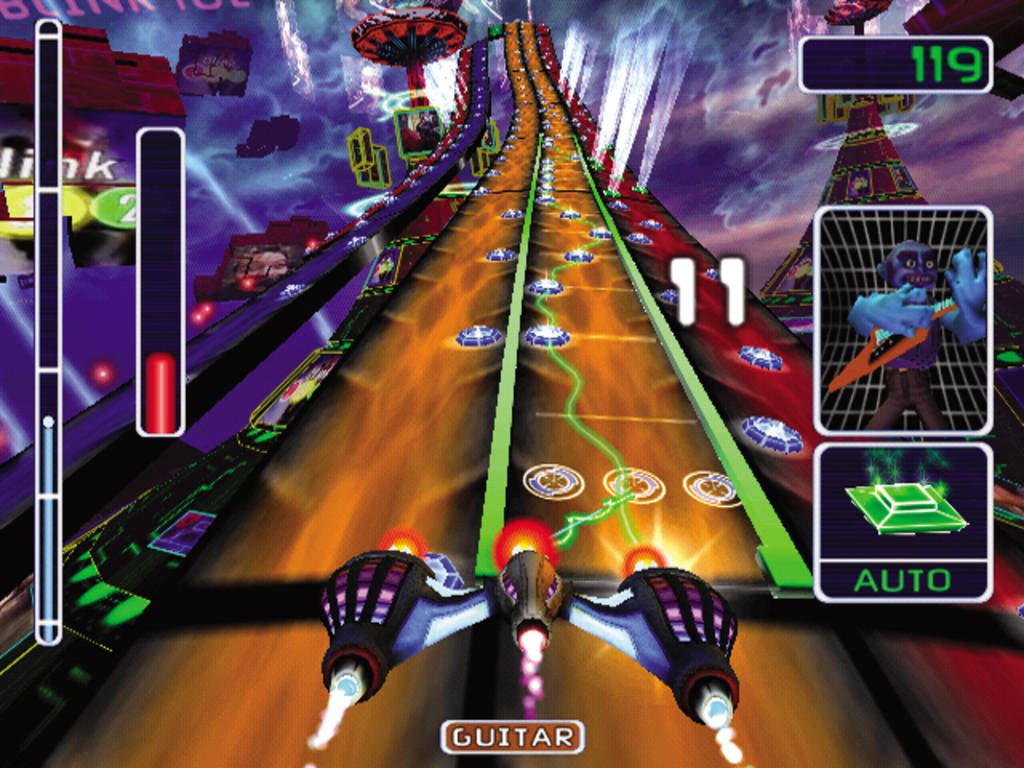
The original Amplitude was frenzied, chaotic, and addicting due to it's simple design towards the rhythm of the songs
Where this game differed from, say, Dance Dance Revolution , is the ability to play different parts of a song by moving onto different audio tracks. In Amplitude , the player is not simply pressing buttons to the beat while a song plays in the background -- their success (or failure) actively influences how the song sounds. Miss a phrase on the drum track, and the beat will drop out until you can get your streak back. Ignore the vocal track for too long, and the lyrics cut out mid-chorus. This created a sense of urgency, a scramble to keep every track going in order to hear the song properly. Perhaps most impressively, it encouraged to player to isolate those tracks in their own mind -- to tune out everything else but that one instrument, to really listen to it, in order to overcome the chaos inherent to such a system. It’s something that no other rhythm game had really done, at least not to the same degree, which largely contributed to Amplitude ’s cult-classic status.
It was a cult-classic for sure, but not exactly a financial success. Amplitude was beloved by fans, but the soundtrack and visual style lacked mainstream appeal. Harmonix decided to focus their attention elsewhere, and in 2005 -- two years after the release of Amplitude -- released Guitar Hero . Combining well-known rock songs with a unique guitar controller proved to be exactly what the public wanted. Guitar Hero 2 released the following year, with an even more expansive setlist. In 2007, the Guitar Hero license was purchased by Activision, leading Harmonix to begin development of a new IP, Rock Band , which would feature four different instrument peripherals. The rest is rock n’ roll history.
Yet the fervor for music games has been lessening in recent years, with Guitar Hero Live and Rock Band 4 being just the most recent in a series of disappointing releases. But into this, Harmonix launched a Kickstarter in 2014 with the intent of funding a sequel/successor to Amplitude , inexplicably not titled Ampli2de . The campaign was a success, generating over $800,000 in its 30-day run; Now, as 2016 starts, the new Amplitude was released, taking us back to the start.
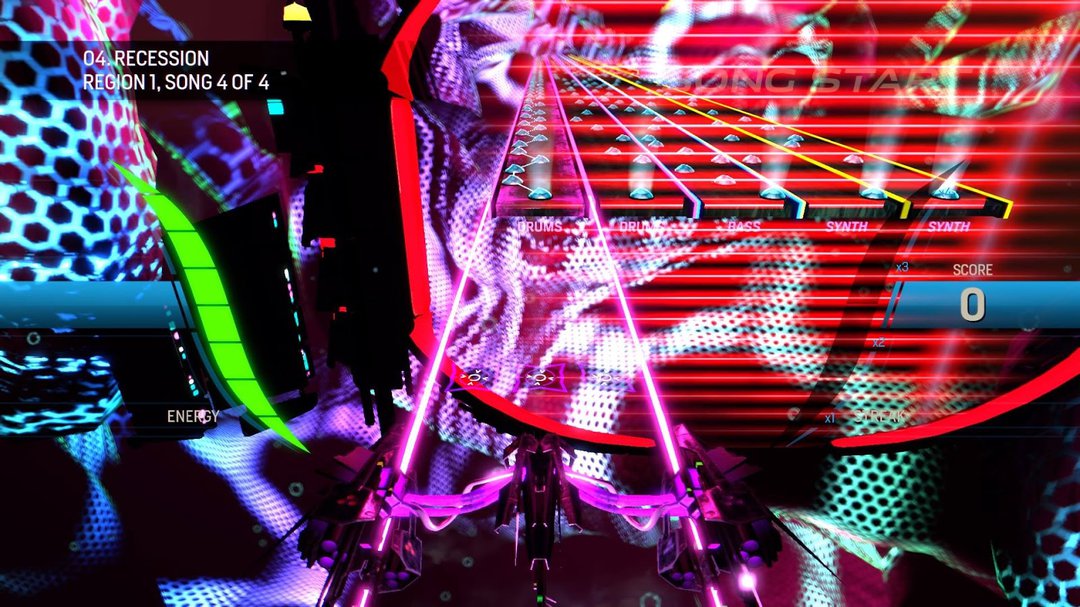
The new Amplitude is a return to the basics of a rhythm game - no peripheral controllers or things to buy, just the music and your nanoblaste
The first thing one notices about the new Amplitude is its distinct visual style: the older games toyed with a similar Tron -like aesthetic, but the backgrounds could often be cluttered and overwhelming. This new game instead opts for a sleek, modern look, with bright pops of neon colors against deep black backgrounds. It harkens back to games like Geometry Wars and Rez , audio-visual experiences to be played with the lights off and the speakers cranked.
The game only continues to surprise from there. Upon entering the career mode for the first time, the game informs you that you’ll be playing through a 15-song original “concept album” centering on a comatose hospital patient, and the attempt to awaken her using a computer interface known as “Amplitude-OS”. The structure of the album meshes well with the structure of the game itself, starting off with low-BPM tracks in familiar time signatures (“Decode Me”, “Dreamer”) that the game uses to introduce mechanics, before ramping up into frenetic and unpredictable songs (“I.C.U.”) that would be challenging to even a seasoned veteran of the series.
The inclusion of an original soundtrack is not all that novel. The surprising bit is that the concept album written by Harmonix, produced by Harmonix, and performed by Harmonix employees for a Harmonix game… is actually pretty good. Frequently I found myself humming the melody to an earlier song while navigating menus or taking a break. Games like Rock Band and Guitar Hero have long used licensed music to draw in players, not necessarily because those songs translate well to the video game medium, but because players are already familiar with them. Due to the fact that much of the music in Amplitude was created with this game in mind, the transition to the interactive medium is much more fluid.
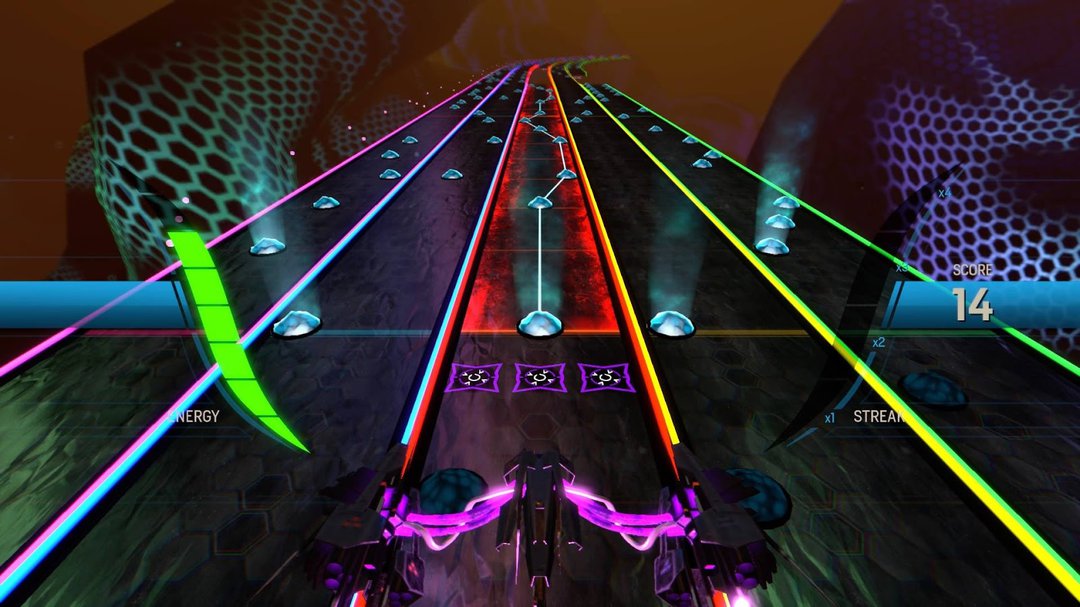
Amplitude, like most other Harmonix games, keeps to four difficulty ratings - the higher you go, the more closely you have to follow the musical beat
Which is not to say that Amplitude is completely bereft of licensed music. Harmonix tapped such talents as C418, Danny Baranowsky, and Darren Korb -- artists that have composed tracks for Minecraft , Crypt of the Necrodancer, and Transistor , respectively. The songs they bring to Amplitude do more than serve as fanservice: they naturally fit within the established style of Harmonix’s original music, expanding the game’s content without sacrificing the aesthetic.
But Amplitude’s impressive track list and commitment to a style would mean nothing if the game didn’t feel good to play. Fortunately, on this front, Harmonix impresses once again. Gameplay is responsive, remaining almost entirely unchanged from the original release, with small quality of life improvements such as lag calibration and a larger frame window to successfully hit notes. In both single and multiplayer the game runs at a fairly consistent 60FPS, with only minor frame-rate hiccups at the end of some songs when particle effects on the backgrounds tend to pick up. And, just like the original, Amplitude ’s track-switching mechanics feel incredibly satisfying. It forces to player to actively engage with the music, paying attention to elements of a song that would be missed on a casual listen.
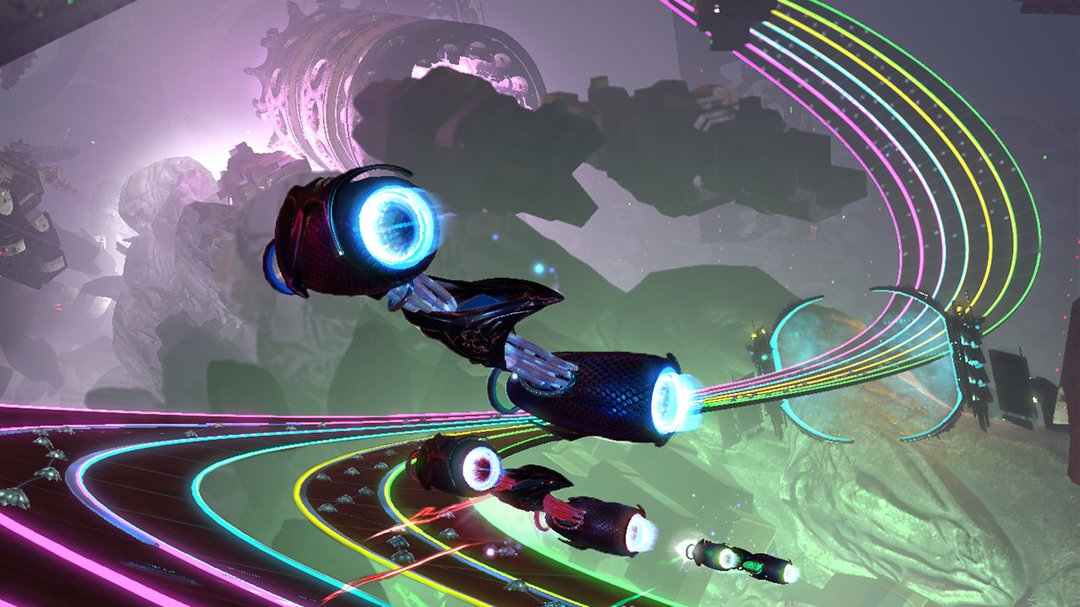
Don't worry, this new version of Amplitude has new multiplayer and leaderboard tracking too, giving you a reason to keep perfecting those tracks
The original Amplitude was a wonder of a rhythm game, and that’s not just the nostalgic ramblings of someone who played it from age 10 until the present. Its eclectic mix of tracks - from Korn to David Bowie to Freezepop - was fascinating in its strangeness. It never felt disorganized; it felt raw and unfiltered, like listening to a mixtape of someone’s favorite music. Even beyond the music curation, it was the great gameplay which allowed me to engage with that music, on a level deeper than just experiencing it in the background. Even in the years that followed, as I worked my way through the trenches of Guitar Heroes and Rock Bands , a part of me missed that feeling.
Which is why the new Amplitude is so important, particularly now. It’s a rhythm game without any gimmicks. It’s not a karaoke game to be played during a party, or something to tap on your phone while waiting for a bus, or a rockstar simulator. Amplitude is a video game about music, and a pretty fun one at that. 2015 may not have been the best of years for the rhythm genre, but 2016 seem to be off to a rollicking start. Here’s hoping that trend continues.
Are you already a fan of the new Amplitude? Tell us what your favorite track is so far in the comments, or better yet, come find our Facebook and brag about how you're already beating the game on Super difficulty. Like our articles, or want to start writing for us as well? Contact us here, or follow us on Twitter to stay on top of all the new articles!